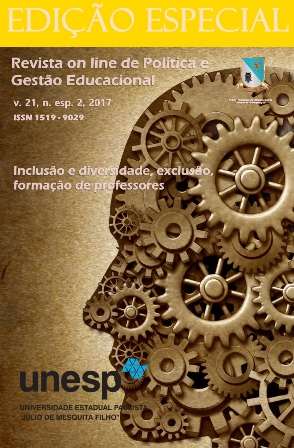The role of the educator in the post-modern society
DOI:
https://doi.org/10.22633/rpge.v21.n.esp2.2017.10162Keywords:
Educator. Educating. Emancipatory education.Abstract
The present text deals with the understanding that in the human world interaction, it is possible to construct another social reality and, therefore, another society, more just and egalitarian. Considering the role of the educator in postmodern society, reflecting on the need to develop a teaching work that is the driver of an emancipatory education, in which the problematization is present as a way to lead the students to become aware Of which they are historical beings in permanent construction, as well as the socio-economic and cultural reality that surrounds them, is a historical product. Thus, educators need to be clear that teaching is not a neutral act, it can also contribute to the conservation or innovation of the society we have. In this sense, it is necessary the commitment not only of the educators, but of all those involved in the teaching-learning process, as well as the elaboration and execution of public policies For the Brazilian education that in fact excel by an emancipatory education, breaking with any rancid of excluding education, directed towards the capitalist market.
Downloads
References
LUCKESI, C. C.; PASSOS, E. S. Introdução à filosofia: aprendendo a pensar. 3º ed. São Paulo: Cortez, 2000.
ANTUNES, C. A melhor escola para alfabetizar. Revista Veja: Abril, Ano 39-nº 16. 26 de abril de 2006. p.118.
BRENNAND, Edna. O Labirinto da educação popular. João Pessoa: Universidade/UFPB, 2003, p. 57–102.
CORTELLA, M. S. A escola e o conhecimento: fundamentos epistemológicos e políticos. São Paulo: Cortez, 2008.
FERNANDES, F.; LUFT, C.; GUIMARÃES, F. Dicionário Brasileiro Globo. 17 ed. São Paulo: Globo, 1999.
FREIRE, P. Educação como Prática da Liberdade. 30 ed. Rio de Janeiro: Paz e Terra, 2007.
FREIRE, P. Educar para transformar: fotobiografia. São Paulo: Mercado Cultural, 2005.
FREIRE, P. Pedagogia da autonomia: saberes necessários à prática educativa. 34 ed. São Paulo: Paz e Terra, 1996. (Coleção Leitura).
FREIRE, P. Pedagogia da esperança: um reencontro com a pedagogia do oprimido. 3 ed. Rio de Janeiro: Paz e Terra, 1992.
FREIRE, P. A Importância do Ato de Ler: em três artigos que se complementam. 47 ed. São Paulo; Cortez,1992.
FREIRE, P. A educação na cidade. São Paulo: Cortez, 1991.
FREIRE, P. Pedagogia do oprimido. 11 ed. Rio de Janeiro: Paz e Terra, 1982.
FREIRE, P. Conscientização Teoria e Prática da Libertação: Uma Introdução ao Pensamento de Paulo Freire. 3 ed. São Paulo: Moraes, 1980.
LAVILLE, C.; DIONNE, J. A Construção do saber: manual de metodologia da pesquisa em ciências humanas. Adaptação Lana Mara Siman. Porto Alegre: UFMG / ARTMED, 1999. Cap. IV; V; VI e VII.
RODRIGUES, J. M. C. (org.). Formação docente: contribuição do Ideário de Paulo Freire – João Pessoa: Sal e Terra. 2006.
RODRIGUES, J. M. C.; PIMENTA, S. A.; BORGES, O. de M. Dimensões teóricas, práticas e avaliativas na construção da formação continuada: desafios para o século XXI. João Pessoa: Mídia Gráfica Editora, 2013.











